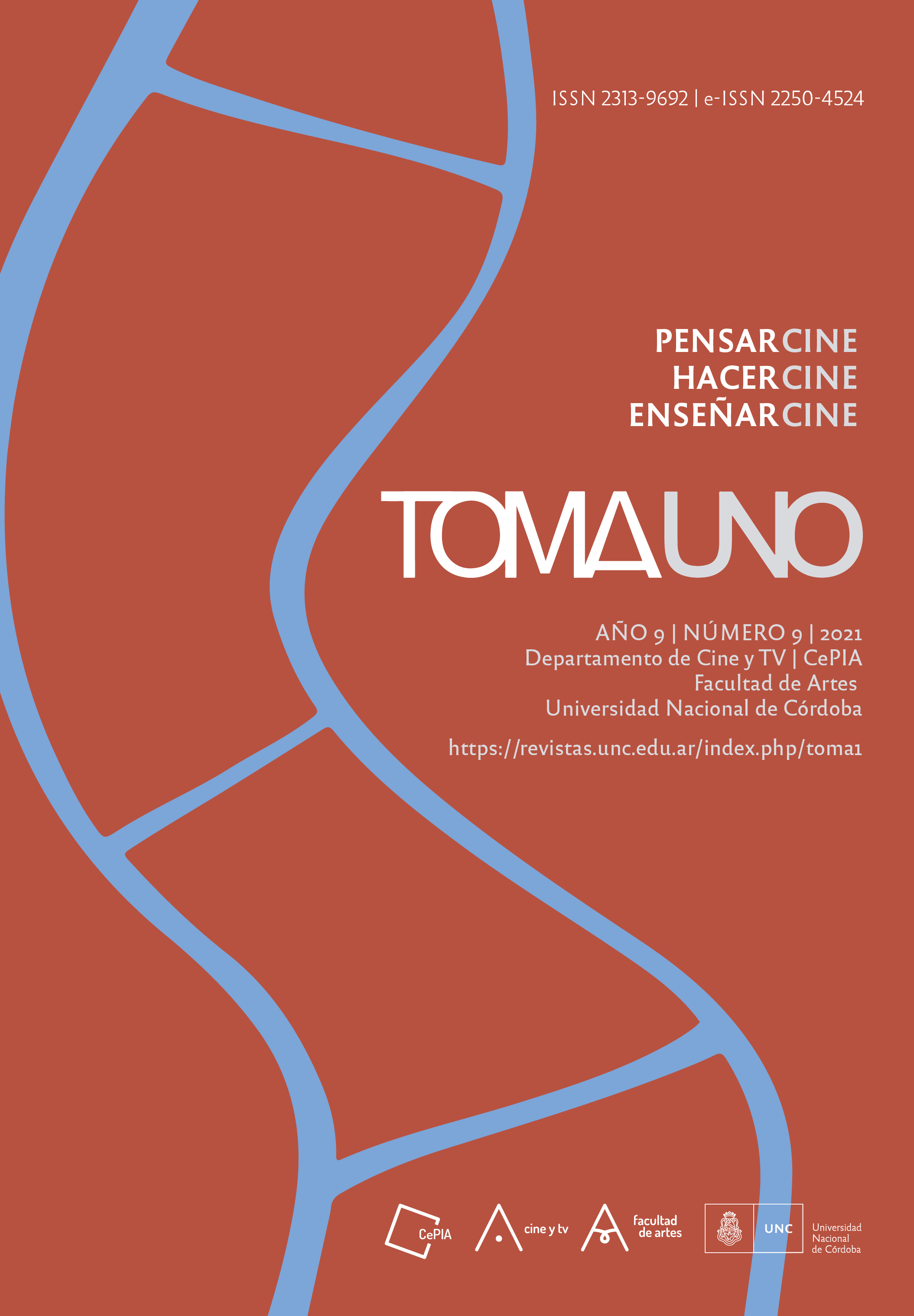Thoughts towards an investigation on the argentine modern cinema
DOI:
https://doi.org/10.55442/tomauno.n9.2021.35790Keywords:
aesthetics, politics, narrative ruptures, hegemony, counter-hegemonyAbstract
This article is part of a first approach towards a study of the Argentine modern cinema from late ‘60s and early ‘70s years. We will focus on the first productions of the directors Hugo Santiago (Invasión, 1969), Alberto Fischerman (The Players vs Angeles Caídos, 1968), Edgardo Cozarinsky (... (Dot, dot, dot), 1970) and Julio Ludueña (Alliance for Progress, 1971). In all this films by these authors during this period we can point out breakups in the narrative modalities and the screen staging that differentiate them from other contemporary films such as those that follow the classical narrative and even with others that challenge it, such as the ones from the Generación del 60 (60s Generation) and the Cine Militante (Militant Cinema) filmmakers. We will focus on finding a common ground between all these productions and how they interrelate with politics and a vision of their need to talk about a new cinematographic aesthetics.
Downloads
References
Abramovictz, F. y Folgosi, T. (2021). Las potencialidades del cine de ficción como gesto de resistencia. Entrevista a Julio Ludueña. Imagofagia, 23, pp. 475-493. Recuperado el 2021, 13 de octubre de http://www.asaeca.org/imagofagia/index.php/imagofagia.
Aguilar, G. (2009). La salvación por la violencia: Invasión y La hora de los hornos. En Episodios cosmopolitas en la cultura argentina (pp. 85-120). Buenos Aires: Santiago Arcos Editor.
Aumont, J. y Marie, M. (2006). Diccionario teórico y crítico del cine. Buenos Aires: La Marca.
Comolli, J. L. (2015). Cuerpo y cuadro. Cine, ética, política. Volumen 1: La máquina-cine y la obstrucción de lo visible. Buenos Aires: Prometeo.
Dussel, E. (2017a). Las tres configuraciones del proceso político. Reflexiones sobre el Estado en V. I. Lenin. Cuadernos Filosóficos / Segunda Época, (14), 18-29. Recuperado el 2021, 13 de octubre de https://doi.org/10.35305/cf2.vi14.29
Dussel, E. (2017b). Siete hipótesis para una “estética de la liberación”. Cuadernos Filosóficos / Segunda Época, (14), 30-65. Recuperado el 2021, 13 de octubre de https://doi.org/10.35305/cf2.vi14.30
Fischerman, A. (1993). Actor rebelado, actor revelado. Revista Film, (2), pp. 32-34. Recuperado el 2021, 13 de octubre de https://ahira.com.ar/revistas/film/
Martin, A. (2008). ¿Qué es el cine moderno? Santiago de Chile: Uqbar editores.
Oubiña, D. (Comp.) (2002). El cine de Hugo Santiago. Buenos Aires: Ediciones Nuevos Tiempos.
Schoo, E. (1972). Un nuevo cine argentino. Revista Panorama (276), pp. 54-56. Buenos Aires: Panorama S.A.
Wolkowicz, P. (2011a). Un cine contestatario. Vanguardia estética y política durante los años setenta. En A. L. Lusnich y P. Piedras (Eds.), Una historia del cine político y social en Argentina (1969-2009) (pp. 411-438). Buenos Aires: Nueva Librería.
Wolkowicz, P. (2011b). Reflexiones de los cineastas under. Militantes del partido cinematográfico. En A. L. Lusnich y P. Piedras (Eds.), Una historia del cine político y social en Argentina (1969-2009) (pp. 105-112). Buenos Aires: Nueva Librería.
Bejo, M. (Dir.) (1971). La familia unida esperando la llegada de Hallewyn. Argentina: Producción independiente/clandestina.
Bejo, M. (Dir) (1978). BetoNervio contra el poder de las tinieblas. Argentina: Producción independiente/clandestina.
Cozarinsky, E. (Dir.) (1971). … (Puntos suspensivos) [largometraje]. Argentina: Producción independiente/clandestina.
Filippelli, R. (Dir.) (1971). Opinaron [mediometraje]. Argentina: Producción independiente/clandestina.
Fischerman, A. (Dir.) (1969). The Players vs Ángeles Caídos [largometraje]. Argentina: Producción independiente/clandestina.
Ludueña, J. (Dir.) (1971). Alianza para el progreso [largometraje]. Argentina: Producción independiente/clandestina.
Ludueña, J. (Dir) (1974). La Civilización está haciendo masa y no deja oír. Argentina: Producción independiente/clandestina.
Santiago, H. (Dir.) (1969). Invasión [largometraje]. Argentina: Proartel.
Published
How to Cite
Issue
Section
ARK
License
LicenseThis work is licensed under Creative Commons Attribution-NonCommercial-NoDerivs 2.5 Argentina .


































